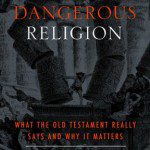One time a student came to my office and rather doggedly and aggressively said, “I don’t believe in God.” I knew the student a bit and I knew the student’s family, and I knew enough about the situation to say something that can only be taken as a “prompting.” I said to him, “What I think is that you don’t like your dad.” He stared at me so I suggested more: “You don’t really not believe in God. You don’t like your dad, and your dad is a pastor and therefore you reject not only your dad but everything he stands for.”
 Odd thing is that the student agreed with me. Over his college career he gained back most of his faith.
Odd thing is that the student agreed with me. Over his college career he gained back most of his faith.
I don’t do that sort of thing very often, but I did then. The whole idea — that our faith in God is connected to our faith in our father — is hardly a new idea, but it all came back to me in reading Paul Vitz’s essay in A Place for Truth: Leading Thinkers Explore Life’s Hardest Questions.
Faith and fatherhood are connected. What do you think of Vitz’s study here? Has this thought ever occurred to you in discussions with atheists? What are the weaknesses of this approach?
His approach is to explore the psychology of atheism, and he observes in passing that this is not unlike the many more studies on the psychology of belief or the psychology of religion.
He begins with his own story, a story of becoming an atheist for reasons hardly connected to deep philosophical or intellectual rigor: he wanted to be seen as more than his background (the Midwest), he wanted to be accepted among intellectuals of psychology, and he wanted to have a more convenient — pleasure etc — lifestyle.
But there are better and deeper psychological reasons for atheism than his:Here he enters into dialogue with Freud, and Freud’s theory of illusion (the need for a father figure) and projection (projecting onto God what we think we need or want) and then the Oedipus complex … and Vitz knows that scholarship has reshaped these ideas of Freud’s. What came to light for me was that Freud didn’t hardly know a religious believer and that Freud’s father was a weak figure.
This leads Vitz to a proposal about one major factor in the psychology of atheism: many atheists, and he trots a good number, had/have defective fathers. He probes into Freud, Marx, Feuerback, O’Hair and others. By defective he’s talking about things like absence, mean-spiritedness, tragic death, abusiveness…
Vitz is a psychologist, and this sketch is clinical. He is in no way dismissing the serious issues at work in troubled fatherhood relations. Nor is he explaining away atheism as therefore something not serious for those with healthier fathers. His study leads him to compassion and sympathy and understanding.
When someone in the audience, an atheist, when Vitz gave this paper, said his study fit him to a “T”, he then asked what he should do … and Vitz said “Be the father to other people that you never had.”











